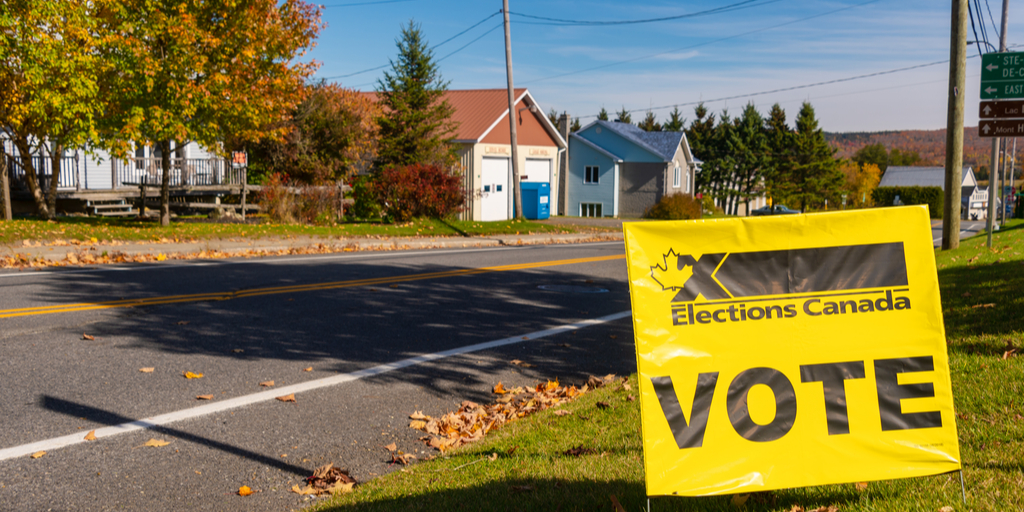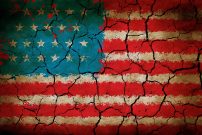Many of the traditions that Burke defended were salutary restraints on power. Conservatives shouldn't forget that America has such an inheritance, too.
Is Canada's Liberal Nationalist Regime Ending?
Canada’s recent election disappointed those who sought a decisive result one way or the other. Justin Trudeau and the Liberal Party will survive as a minority government, albeit with the smallest vote share of any majority or minority government in Canada’s history. Yet Canada’s Conservative Party, despite having an energised base and facing a government marked by serious scandals, failed to achieve victory.
This election demonstrates the abiding wisdom of George Grant’s 1965 essay, Lament for a Nation: The Defeat of Canadian Nationalism. Long before the post-2016 populist wave, Grant conceived of Canadian politics in terms that have now become familiar: as a struggle between an entrenched ruling class and potential populist challengers. Grant argued that the only effective challenge to the ruling class would come by linking populism with nationalism. Lament provides us with overlooked but valuable tools for understanding 21st century politics.
Grant wrote Lament following the 1963 election, when the Liberal Party beat Conservative Prime Minister John Diefenbaker. The election confirmed that the Liberal Party of Canada would be the natural governing party of postwar Canada. It also confirmed the homogeny of Canada’s ruling and opinion-forming class. Alongside its political instrument, the Liberal Party of Canada, the ruling class united in “shouts of sophisticated derision” to bring down Diefenbaker. Since then, those shouts of sophisticated derision have become habitual, and the Conservatives have only won five elections.
For Grant, the Canadian ruling class goes from Liberal Party politics to move in and out of the universities, corporations, civil service—and back into Liberal Party politics. There is no real distinction between the leaders of the Liberal Party and the ruling class. Grant also drew attention to the regional character of the ruling class, the so-called ‘Laurentian’ elite, which ran the country in the interests of Toronto-Montreal or the “industrialised complex” of Central Canada. As the ruling class is also an opinion-forming class, it does not just control Canada’s media—it is the media. Through the state-funded CBC, which in Grant’s judgement gave “too great prominence to the Liberal view of Canada” (now even more so), the Toronto-Montreal media constructs a largely imagined national consensus. Controlling the national debate (now even more so), the media requires every election to be fought around this fictitious consensus.
21st Century Populism and Stephen Harper
Because Grant saw Canada as governed by a ruling class, he argued that the only effective electoral challenge to this ruling class could come through populist governments, representing not just one region but “all the regions of the country” against the arrogance of the political elite. Diefenbaker achieved as much, most brilliantly in 1958. But his failure in 1963 meant Liberal dominance for decades.
In the 21st century, the revival of Grant’s idea of populist nationalism came from an unexpected figure: Stephen Harper. Harper’s chief biographer portrayed him as an economic libertarian who wanted to make the government less important in Canadian life. Yet Harper’s own self-understanding was as a pre-2016 populist who recognised that economic policies had to be tailored to the national interest.
Prime Minister of Canada from 2006-2015 during the turbulent economy of the Great Recession, Harper used the policy instruments that give libertarians nightmares—agricultural subsidies, regional development boards, economic stimulus packages, targeted tax credits—to govern on behalf of David Goodhart’s “somewheres” rather than the “anywheres.” Harper’s ex post facto account of himself is most persuasive as a critique of Laurentian elites and their priorities and how he challenged their influence. This is where his own account of how to govern in the 21st century is closest to Grant.
From Grant’s point of view, however, Harper’s populism had clear defects. Harper’s last election campaign in 2015 was not about the populist nation-building, but economic managerialism. Moreover, the Harper of Right Here Right Now is quiet about the prairie populism that he supported as a young man. It’s worth remembering the Reform Party’s populism, which was the strongest and most articulate manifestation of how prairie populism could turn into an effective government. The Reform Party offered full-fledged challenges to the whole Laurentian regime. It attacked the judicial activism promulgated by Central Canada’s “Court Party” and sought a more democratic, responsive government.
Moreover, the Reform Party was not just about changing federal politics. Its legacy was to change provincial politics. In Alberta its supporters pushed economic reforms that made Alberta become one of the most economically attractive zones in the country. It also sought to change the dynamics of Canadian federalism. One of the most daring proposals that came from the Reform Party’s legacy was the “Firewall” document. This agenda recommended a number of ways that Alberta could strengthen its own position within the Confederation (and other provinces could follow suit). But once Harper won a federal election, these more ambitious ideas—including the Firewall—were set aside.
Because of Harper’s ambiguous populist legacy, different populist challenges to Canada’s ruling elite have appeared in the past few years.
Five Versions of Post-2016 Populism
The most explicit version is what Maxime Bernier attempted. A longtime Conservative who lost the Party leadership contest to Andrew Scheer in 2017, Bernier went off to form his own party, the People’s Party of Canada. Bernier, however, is a doctrinaire libertarian. His populism was effectively an accusation that Harper lacked free-market purity. Recognising that not everyone sees agricultural subsidies as the same nightmare, Bernier tried to combine Cato Institute libertarianism with a campaign to reduce immigration. Bernier is perhaps the only self-styled populist in the West who tried to use anti-immigration policy as a front for economic policy, rather than the other way around. Unsurprisingly, he failed to win a single seat in the 2019 election.
The second version is the attempt to repeat what Harper did, which was Andrew Scheer’s strategy. In light of the election result, however, it’s clear that this strategy has severe drawbacks. First, the Laurentian ‘consensus’ issue of 2019 was how to “make sure Canada remains an outpost against all the nativism, polarisation, authoritarianism, demonization of enemies that Trump has unleashed in the United States.” Attacked by the Liberals as alt-right, Scheer took such drastic measures as distancing himself from that most alt-right of issues, Brexit (who knew that Tony Benn is the godfather of the alt-right).
The election thus became a proxy for post-2016 American politics, exemplified in the energy with which the Liberals tried to get Barack Obama’s endorsement for Justin Trudeau. In this strange way, Trump ended up on the Canadian ballot. Second, Scheer’s campaign attempted to focus on cost-of-living issues in the Greater Toronto Area, and promised the average family $850 in tax savings. In the turbulent economy of the Great Recession this strategy could work much better. But couched against systemic rises in cost-of-living, promising an extra coffee a day for hard-pressed families is hardly the inspiring vision necessary to win over suburban swing voters.
Third, the Scheer campaign was too timid to speak properly to Quebec. Here Grant was already a voice crying in the wilderness. He had written Lament for English Canada, but he admired Quebec as a bastion of nationalism and severely criticised Diefenbaker for not taking Quebec seriously. This was, in Grant’s view, one of the most significant lost opportunities for Canadian conservatism. Quebec is the most anti-Lockean place in North America: it came into Confederation not to secure the natural rights of individuals but to secure the rights of a nation.
From Grant’s standpoint, the Reform Party repeated Diefenbaker’s error, because it denied Quebec’s distinct place in Confederation and aspired to treat all provinces equally. Consequently by the early 2000s the Conservative Party of Canada was starting from zero in Quebec. But one of Harper’s most important achievements was to recognise that the rights of the nation, not simply the rights of individuals, merited a place in Canada. Harper did what no Quebecker Liberal Prime Minister ever did: he passed a parliamentary motion recognizing Quebec as a nation.
Inclined to think of Quebec as inherently progressive or as fixed on the vieilles chicanes of 1990s separatism, in 2019 the Conservatives missed the significance of the third post-Harper populism in Canada: the resurgence of Quebec nationalism. The question of Quebec identity—who and what the Quebec nation is and what steps it must take to survive—is now at the forefront of Quebec politics. It explains why in their last provincial election, Quebeckers dropped the two political dynasties that have governed the province since the Quiet Revolution, the Provincial Liberal Party and the Parti Quebecois. Though both are diametrically opposed on separatism, both were much closer to each other than it appeared. Both understood Quebec identity in the terms manufactured after the Quiet Revolution: of Quebec as a secular, non-Christian society where the sole measure of distinct identity is the ability to speak French. Thus both parties offered Quebeckers a progressive, cosmopolitan agenda that disregarded deeper questions of historical and cultural identity. The most articulate and pronounced sceptics of Canada’s multicultural orthodoxy are now in Quebec. This scepticism of multicultural progressivism looks for how French Canada can once again be the refuge and anchor of French civilisation in the immense sea of l’américanisme saxonisante (for we should remember that progressisme is itself an américanisme). What the Conservatives had to do from the start was declare that Quebec has the Constitutional right to preserve its own identity. Scheer attempted this belatedly with a clever turn on an old sovereignty slogan (Maître chez nous became Maître chez vous). Yet these efforts came too late.
The fourth kind of populism comes from the left. Harper and Grant both recognized this kind of populism in Canada. The most successful version of left-wing populism peaked in Canada in 2011, when well-liked NDP leader Jack Layton managed to carry large sections of Toronto and Quebec. Layton’s achievement was to label both the Liberal Party and Quebec’s Bloc Quebecois as out of touch elites, and present himself as a likeable alternative. But he died immediately after his victory and no leader since has been able to offer a similarly successful brand of left-wing populism.
In Lament Grant explicitly toyed with the idea of Canadian socialism, a Castro-esque blend of socialism and nationalism. Yet he thought left-wing populism had no future in Canada. According to Grant, the most successful versions of left-wing populism were in less-developed societies where the citizens believed that the capitalist empire was preventing the nation from industrializing. Only here would a leftist populism develop that would nationalize or “expropriate the oil properties and take on international capitalism.”
Like the American left, the Canadian left now has little interest in nationalized expropriation of the oil properties. But it does have an interest in destroying them. Since the oil properties are primarily in Alberta, the ascent of a new kind of left-populism in Canada comes by inviting Central Canada to join an alliance to crush the oil economies of the West. This is the kind of politics Trudeau has begun to rely on. Trudeau explicitly appealed to Quebeckers to vote for him to stop the oil and gas industry. Trudeau said: “It’s necessary to have a strong government, full of Quebecers, full of francophones, who are going to be able to continue the fight.” Trudeau’s rhetoric is the same as if a US Presidential candidate, anxious to boost turnout with Philadelphia progressives, promised a government full of Pennsylvanians in order to fight against Texas. It is a blatant way of turning one region of the country against another.
Grant’s disgust with Canada’s ruling elite had a pessimistic arch, partially because he wrote when economic, political, and cultural power were firmly in the hands of the Laurentian elite. Outside of French Canada, there was no alternative to that elite. At the time, Western Canada was a junior partner in Confederation, but this has changed. The question for the future of Canada is whether Alberta can turn its economic power into political and cultural power. That requires training a new elite in Alberta that can challenge the hegemony of the Laurentian elite. But that long-term plan depends on boosting Alberta’s economic growth.
This is the danger leftist anti-oil populism now poses. If that stance becomes mainstream in Laurentian political culture, it will generate not only the blocking of oil-economy related infrastructure expansion but also a federal regulatory apparatus and tax regime designed to punish Alberta’s economic base. Alberta and its inhabitants could be the victims of an old-fashioned elite attempt to crush the proles.
Faced with this threat, a fifth version of populism will emerge. Ideas about targeted federal tax credits will pale in significance next to basic questions of livelihood and fundamental constitutional questions about whether Confederation is failing Albertans and the Western provinces. Those Reform Party ideas abandoned during Harper’s nine years, about challenging equalisation payments, using provincial constitutional powers to counter judicial activism, and building up greater fiscal independence, will look much more attractive. This path will resemble the 1990s prairie populism, with one important difference: Western Canada is now much more economically and politically powerful. It has much more to lose and much more to gain.
As this writer observes, the most important populist movement in Canada’s future will not be found at the national level, dominated as it is by Canada’s ruling class. In Quebec and especially in the West, what we will see are localised challenges to the whole Liberal multicultural regime, from its interpretation of the constitution to its economic, cultural, and political priorities. It is in these regions that we can anticipate modified slogans from 2016: “Take Back Control,” and “Build the Firewall.”



